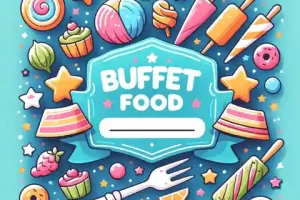The Banana Nutrition Facts Label is a list that shows us what we get when we eat a banana. This label helps us know that bananas are good for us.
Bananas have a little bit of fat, no bad cholesterol, and they give us energy. Let’s learn more about why bananas are so good!
Understanding Banana Nutrition Facts Label
Basic Nutritional Values
A typical medium-sized banana (about 118 grams) offers the following nutritional values:
- Calories: Approximately 105-110 calories, making it a moderate-calorie fruit.
- Carbohydrates: Around 27 grams, primarily composed of sugars and dietary fiber.
- Dietary Fiber: About 3 grams, contributing to digestive health.
- Sugars: Natural sugars like fructose, glucose, and sucrose amount to about 14 grams, providing quick energy.
- Protein: Roughly 1.3 grams, not a significant protein source.
- Fat: Bananas are virtually fat-free, with less than 0.5 grams per serving.
Vitamins and Minerals
Bananas are rich in various vitamins and minerals:
- Vitamin C: Essential for immune function and skin health.
- Vitamin B6: Important for brain health and metabolism.
- Potassium: High in potassium, crucial for heart health and blood pressure regulation.
- Magnesium: Aids in muscle function and bone health.
- Manganese: Supports metabolism and antioxidant defenses.
Health Benefits of Bananas
Bananas are not just yummy; they are also packed with lots of things that are good for your health. Let’s talk about how bananas can help you stay healthy:
Digestive Health
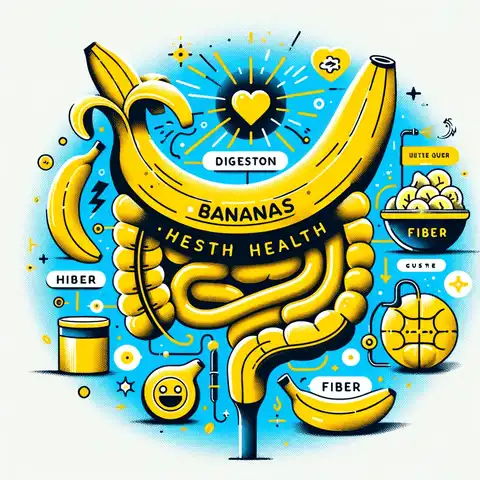
- Fiber is Key: Bananas have fiber, which is great for your tummy. It helps you digest food better and keeps your bowel movements regular.
- Happy Tummy: Eating bananas can make your tummy feel good and can stop you from feeling uncomfortable or bloated.
Energy Source
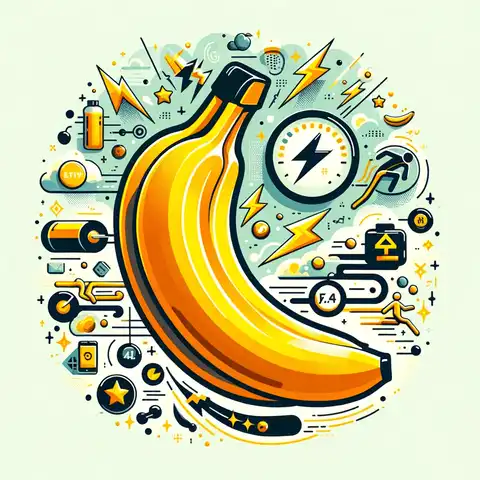
- Quick Energy: Bananas give you fast energy. They have natural sugars and carbs that your body uses to get moving.
- Stay Active: They are perfect for when you need a quick boost, like during a busy day or before sports.
Heart Health
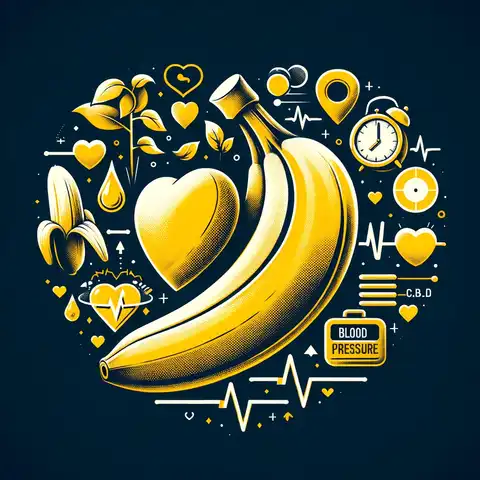
- Potassium Power: Bananas are full of potassium, which is super important for your heart.
- Blood Pressure: Eating bananas can help keep your blood pressure at a good level, which is important for a healthy heart.
Workout Snack
- For Exercise: Bananas are a favorite snack before or after working out. They have carbs and potassium, which help your muscles work well and recover after exercise.
- Stay Strong: Eating a banana can help you feel more energetic during your workout and help you feel better afterward.
Weight Management
- Feel Full: The fiber in bananas can help you feel full. This means you might not feel hungry for a while after eating a banana.
- Healthy Snack: This can be really helpful if you’re trying to watch your weight. Bananas are a healthy snack that can stop you from eating too much.
Bananas are a great choice for a healthy snack.
Understanding the Downsides of Bananas
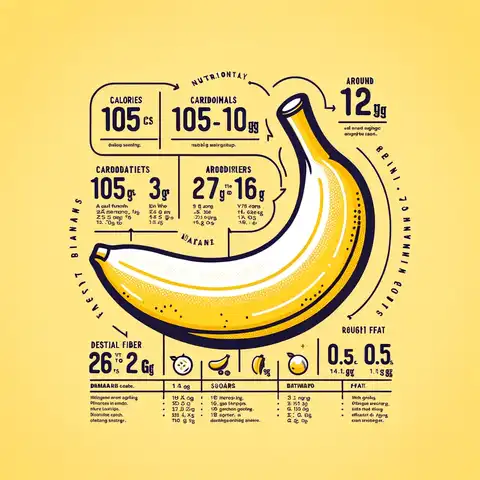
Bananas are a popular fruit, but they’re not perfect for everyone. Let’s look at some reasons why bananas might not always be the best choice:
Sugar Content in Bananas
- Natural Sugars: Bananas have sugars naturally. This can be a problem for people who need to watch their blood sugar, like those with diabetes.
- Blood Sugar Levels: Ripe bananas can make your blood sugar go up quickly because they have more sugar.
Bananas and Calories
- Calories: Compared to some other fruits, bananas have more calories. If you’re trying to eat fewer calories, you might want to think about how many bananas you eat.
Bananas and Special Diets
- Keto Diet: People on diets that need low carbs, like the keto diet, might not find bananas suitable because they have a lot of carbs.
- FODMAPs: Bananas have something called FODMAPs. These can make some people with a sensitive tummy, like those with IBS (irritable bowel syndrome), feel uncomfortable.
Allergy to Bananas
- Allergies Can Happen: Some people might be allergic to bananas, though it’s not very common. Also, if you’re allergic to latex, you might react to bananas too.
Too Many Bananas
- Nutrient Balance: Eating a lot of bananas can give you too much of some nutrients, like potassium. This is not good for people, especially if they have problems with their kidneys.
- Tummy Trouble: If you eat too many bananas, you might have tummy problems like feeling bloated or constipated. This is because bananas have a lot of fiber.
How to Read a Banana Nutrition Label
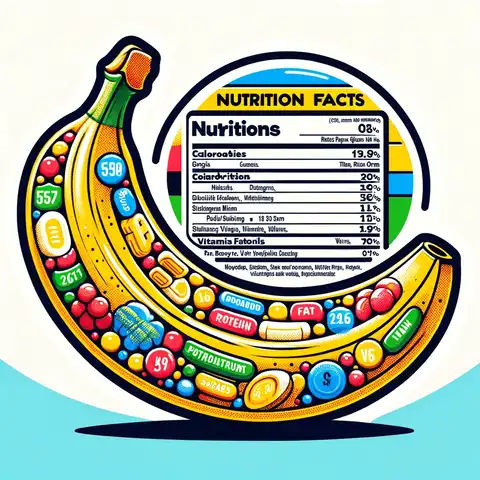
When looking at a banana nutrition facts label , consider:
Reading a banana’s nutrition label is a great way to learn about what you’re eating. Let’s explore how to read it:
Serving Size
- What It Is: This part tells you what the nutrition facts are talking about. For bananas, it’s usually one medium-sized banana.
- Why It Matters: Knowing the serving size helps you understand how much of all the good stuff you’re getting when you eat a banana.
Percent Daily Values (%DV)
- Based on 2,000 Calories: The %DV is calculated based on a diet of 2,000 calories per day. This is just a general guide, as everyone’s needs are different.
- Helps You Understand: The %DV helps you see how much of your daily needs for things like vitamins, minerals, and fiber a banana can give you.
- Easy to Use: If the %DV is high, it means the banana gives you a lot of that nutrient. If it’s low, it gives you a little.
When you read the label on a banana, you can see how much energy (calories), sugar, fiber, and other nutrients it has. So next time you grab a banana, take a quick look at the label and see what good stuff you’re about to eat!
In conclusion, Bananas are really good to eat. They help you stay healthy When you know what’s in bananas, you understand why they are good for you. They help your body.
FAQs about Banana Nutrition Facts Label
How much potassium is in a medium-sized banana?
A medium banana has about 422 milligrams of potassium.
Are bananas cholesterol-free?
No, bananas don’t have any cholesterol.
Do bananas have any vitamin C?
While not as high as citrus fruits, bananas do contain vitamin C. A medium banana provides 10-15% of the recommended daily intake.
Can bananas be part of a diabetic diet?
Yes, in moderation. While bananas contain natural sugars, they also have fiber, which helps regulate blood sugar levels. People with diabetes should consider the ripeness and portion size when including bananas in their diet.
Do the calories in a banana come mainly from carbohydrates?
Yes, the majority of the calories in bananas come from carbohydrates. A medium-sized banana has about 27 grams of carbs, which include sugars and dietary fiber.
How does the nutritional content of a banana change as it ripens?
As a banana ripens, its starches become sugars, making it sweeter. The ripe banana has a higher glycemic index compared to a green one.
Are Bananas Good After Exercise?
Yes, they are! After you work out, eating a banana is a great idea. Bananas have carbs and potassium, which help your muscles get better and give you back your energy.

